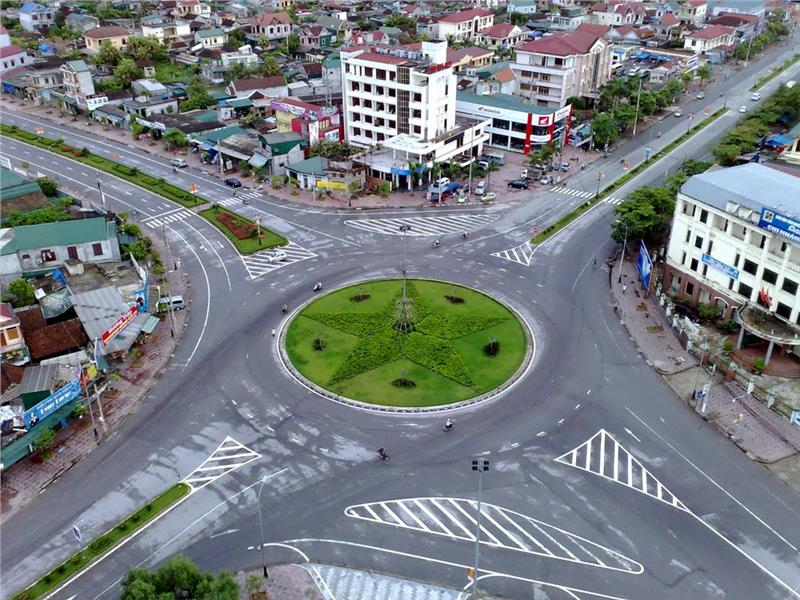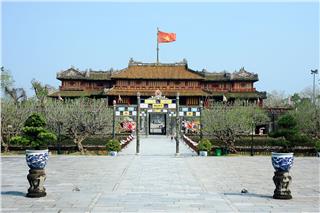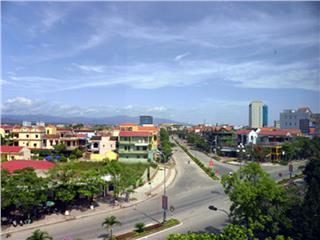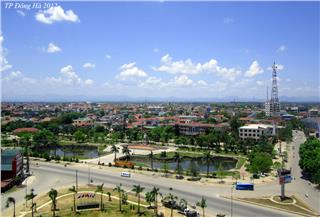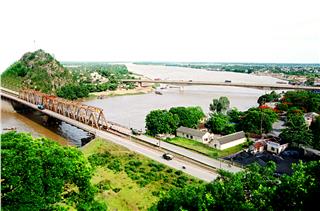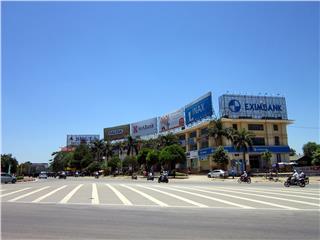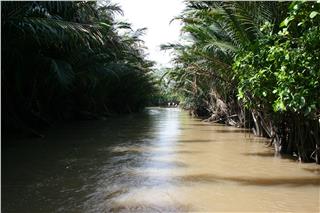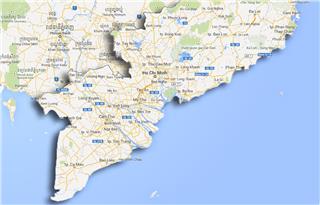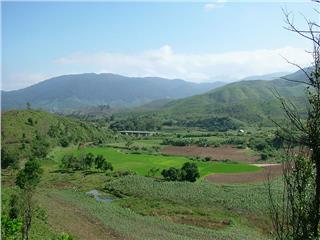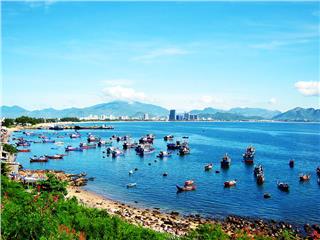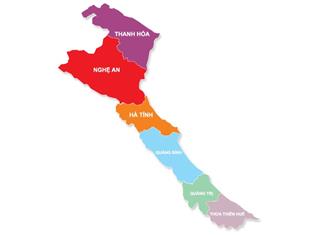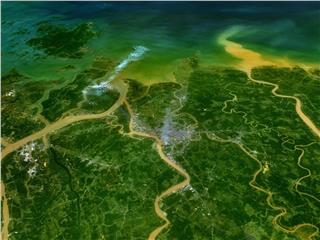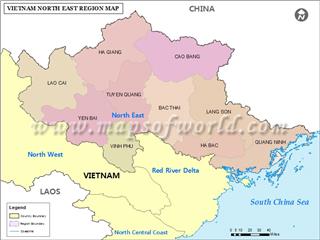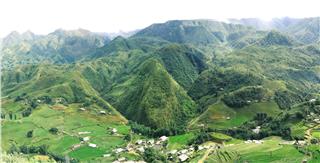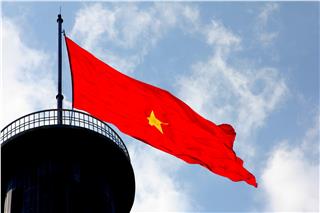Ha Tinh is the land of "Giang son tu khi" not only in a geographical sense but also in cultural sediments through the ages. Also, it is the hometown of heroes, patriotic scholars and eminent cultural celebrities. Besides, it has diverse tourism resource.
Ha Tinh is a province in the North Central Coast Vietnam. Previously, Nghe An and Ha Tinh had a common name of Hoan Chau (the Chinese domination of Vietnam), Nghe An district (under the reign of Ly, Tran Dynasties), Xu Nghe (in 1940, under King Le Thanh Tong) and then Nghe An town. In 1831, King Minh Menh implemented administrative reforms; Nghe An town was divided into 2 provinces of Nghe An (in the north of Lam River) and Ha Tinh (in the south of Lam River). To facilitate the management, King Minh Menh merged Nghe An and Ha Tinh into An Tinh province. In 1976, after reunification day, Ha Tinh and Nghe An were merged into Nghe Tinh province. Since 1991, Nghe Tinh province was separated into 2 provinces of Nghe An and Ha Tinh.
Geography

Ha Tinh is a province in the Central region stretching from 17°54’ to 18°37’ north latitude and from 106°30’ to 105°07’ east longitude. It borders with Nghe An in the North, Quang Binh in the south, Laos in the west and the South China Sea in the east with 137-kilometer coastline. Ha Tinh terrain is diverse with hills, mountains, midland, plains and sea. Ha Tinh is located about 340km from Hanoi to the south, in the east of the Annamite Mountains with narrow and steep topography tilting from West to East. The west of the province is high mountains with the altitude of 1500m, Rao Co peak 2235m high, below is the low hills like bowl, followed by a narrow plain running to the sea, finally, the are coastal sand dunes with many pools and lagoons, typically Vung Ang deep seaport, Thien Cam beach.
There are many small rivers running through Ha Tinh. The largest rivers are La River and Lam River. The total length of rivers is about 400km with the total capacity of 13 billion m³. Additionally, there are Ke Go Lake, Song Rac Lake, Cua Tho Trai Tieu Lake and Dong Quoc Co Dam Lagoon. Located in the tropical monsoon climate, Ha Tinh is also influenced by the transition climate between the North and the South with typical tropical climate of the South and a cold winter of the North, so Ha Tinh climate is very harsh. Ha Tinh has 4 distinct seasons in year.
Rainy season starts from August to November. The average rainfall ranges from 2500mm to 2650mm. Late August, September and mid November, the rainfall accounts for 54% of the total rainfall in year. At this time, Ha Tinh is affected by storms from the South China Sea causing the flood. Dry season lasts from December to July of the following year. This season has strong sunlight, dry and hot southwest monsoon and large evaporation.
History
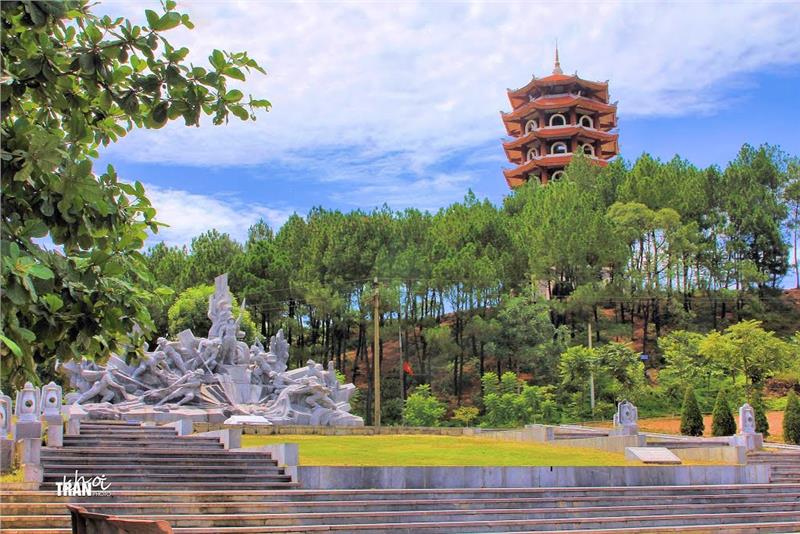
Before the time of the Hung Kings, Ha Tinh and Nghe An belonged to Viet Thuong country. According to Complete Annals of Dai Viet, during the period of Hung Kings, Ha Tinh belonged to Cuu Duc tribe. Under Han Dynasty (Chinese domination of Vietnam), Ha Tinh today belonged to Ham Hoan district, Cuu Chan province. In 1831, King Ming Mang divided Nghe An into 2 provinces including Nghe An (the north of Lam River), Ha Tinh (the south of Lan River). Ha Tinh province was established with 2 districts of Duc Tho and Ha Hoa of Nghe An. During the French occupation of Vietnam, Ha Tinh belonged to Trung Ky (Central region) in Indochinese Federation of the French colonists. After 1945, Ha Tinh was a province belonging to the Central Vietnam. After 1954, Ha Tinh belonged to Bac Viet (Republic of Vietnam). Since the reunification of Vietnam (Socialist Republic of Vietnam), the period from 1976 to 1991, two provinces of Nghe An and Ha Tinh were merged into Nghe Tinh province. On August 12th, 1991, Nghe Tinh province was separated into Nghe An and Ha Tinh as today.
Administration
Ha Tinh has 12 administrative units consisting of 1 city (Ha Tinh City), 2 towns (Hong Linh and Ky Anh), 9 districts (Cam Xuyen, Can Loc, Duc Tho, Huong Khe, Huong Son, Ky Anh, Nghi Xuan, Thach Ha, Vu Quang and Loc Ha), of which there are 262 communal administrative units with 12 towns, 15 wards and 235 communes.
Population
Ha Tinh has 1,229,197 people (Ha Tinh Statistical Yearbook 2011), falling compared the population census in 1999, because a part of migrants moved to other locations, mainly Southern provinces. Kinh ethnic people cover the majority population of Ha Tinh. Other ethnic communities as Chut ethnic people, Thai ethnic people, Muong ethnic people and Lao ethnic people live in districts of Huong Son, Vu Quang, Huong Khe with about a few thousand people living in mountainous regions.
Economy
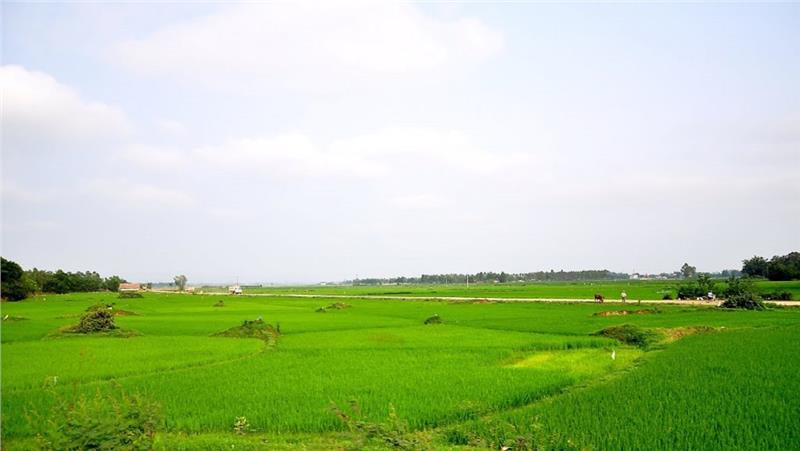
The attention and assistance of the Central Government along with the renewal of leadership methods, the efforts of all political system, enterprises, investors and people, Ha Tinh economy in 2014 continues to grow rapidly and comprehensively in all fields, many indicators reached and exceeded the plan. The GDP growth rate was high reached 25.89% over 2013, of which agriculture-forestry-fishery increased by 6.51%, industry-construction increased 42.06% and services rose 22.26%. GPD per capita achieved 34 million dong. The growth rate of agricultural sector was estimated at 6.51%. The production of agriculture - forestry - fishery (at the constant price 2010) was estimated at 10,522 billion dong. The value per unit of cultivated area reached 65 million dong/ha/year. The proportion of animal husbandry accounted for 44.17% in agricultural value structure. Food production reached 53.3 ten thousand tonnes; the fishery production reached 44,119 tonnes; meat output reached 86,976 tonnes, up 10.7% compared to 2013.
Industry - handicraft increased by 22.93% compared to 2013. The proportion of industrial processing, production and distribution of electricity, gas accounted for 89.96%, the share of the mining industry decreased to 8.16%. Total retail sales of goods and services increased by 19.6% over the same period. Export and import turnover via border gates and seaports in the province were estimated at 3.8 billion USD, an increase of 27% compared to the 2013; local export turnover reached over 138.71 million USD, up 33% compared to 2013; local import turnover achieved 2.3 billion USD, up 4 times over 2013. The state budget in the province increase significantly, in the period 2011-2013 reached 12,585 billion dong, up 2.4 times over the period of 2006 - 2010; in 2014 reached 11,746.6 billion dong, equal 217% of the revenue 2013. Foreign affair operations and foreign trade economy associated with the promotion of investment is enhanced, extended, especially relations with the provinces of Laos and northeastern Thailand, with embassies and organizations, enterprises of Japan, South Korea, Taiwan, Singapore, Canada, Belgium ...
Society
The comprehensive quality of education was maintained, the percentage of student admitted at Universities and Colleges is more and more increasing. Meeting the standards of preschool education for 5 year-old children compulsory primary education and junior education was strengthened and maintained, along with implementing innovative teaching methods; strengthening inspection and evaluation of the quality of teachers, staff management; training and retraining managers and teachers. Job training had positive changes; vocational training according to the orders was strengthened to initially meet the needs of businesses and projects in Vung Ang Economic Zone. The percentage of trained labor achieved 47.85%. Network of clinics is consolidated, strengthened at all levels; the scheme at Satellite Hospital in General Hospital continues to be implemented and technical diagnosis and treatment was improved. The quality of health care has positive changes.
Culture
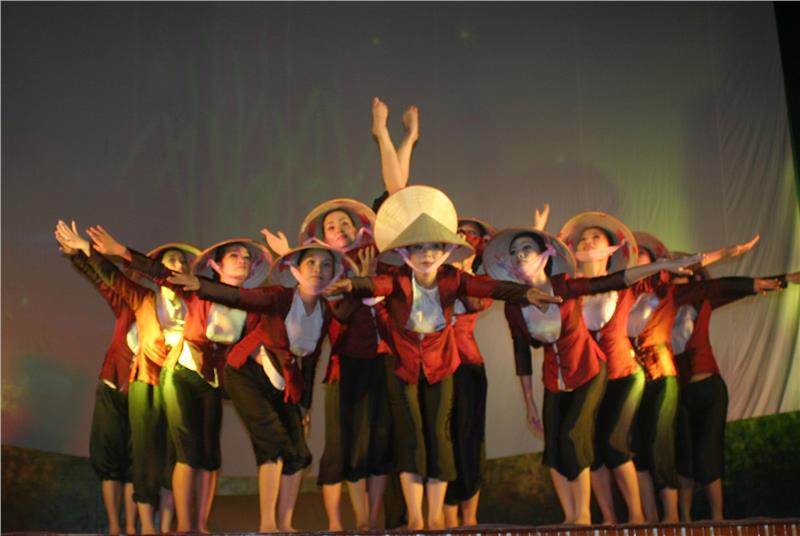
Xu Nghe is the general name of the old Hoan Chau land (including Nghe An and Ha Tinh) under Hau Le Dynasty. Two provinces share a culture called Lam Hong Culture and the same symbol of Hong Mountain - Lam River. These two provinces have the same language- Nghe language and the treasure of folk culture, lullabies, vi dam singings and Lam river. Ha Tinh is a province located in the Central region; the south of Lam River, not bestowed by nature, but it is still consider the "scared land talented people". Hong Linh Mountain with 99 peaks, Ngan Pho River, Ngan Sau River, La River and Lam River are inspiration to poets and musicians. The east of Hong Linh Mountain is Tien Dien village of the great poet Nguyen Du. the author of Truyen Kieu. The southwest of Hong Linh Mountain is "Bat canh Truong Luu" village of Nguyen Huy family. Two civilized villages in two eastern and western flanks of Hong Linh Mountain created "Hong Son van phai" with representative works as Hoa Tien (Nguyen Huy Tu), Mai Dinh Mong Ky (Nguyen Huy Ho) and Truyen Kieu (Nguyen Du).
Villages of Thu Hoach, Truong Luu, Tien Dien, Uy Vien, Dong Thai, Yen Hoi, Goi My, Tan Dau, Trung Le, Bui Xa, Ich Hau, Trung Luong, An Phu are well-known for traditional fondness for learning, academics and literature. In addition, there are many famous art villages in the region as Co Dam (ca tru village), Kieu Xuan Lien (cheo singing village), Truong Luu troupe (vi singing), Dan Du, Phong Phu (vi dam singing village). Many villages has unique festivals as Kim Chuy, Hoi Thong, Dan Truong, Kim Doi, Phu Luu Thuong... Traditional villages with famous ho singings around Hong Linh Mountain, along Lam River, La RIver, Ngan Sau River, Ngan Pho River leave many poems, literature and writings.
Tourism
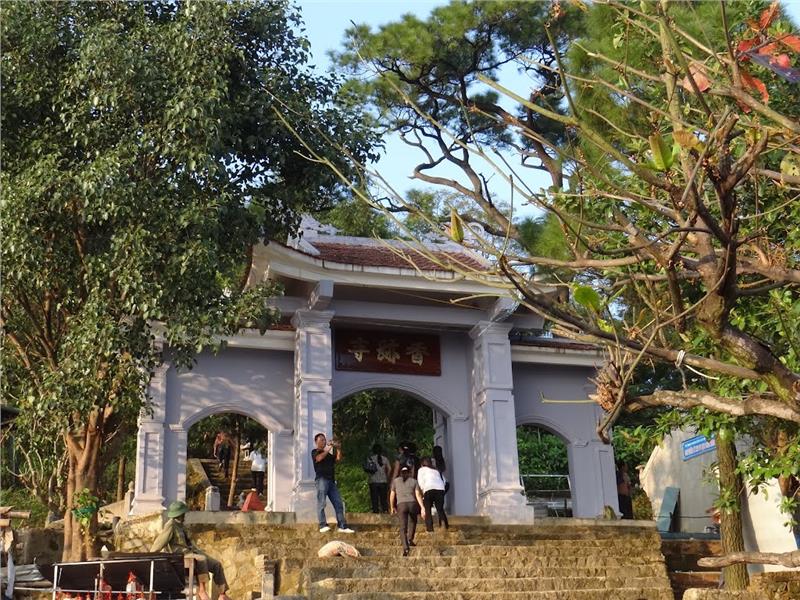
In addition to the unique traditional cultural values, Ha Tinh tourism attracts visitors with many historical cultural sites, beautiful landscapes, stunning beaches, etc. The land and people of Ha Tinh promise to bring exciting experiences for visitors. Huong Tich Pagoda is located on Hong Linh Mountain, in Thien Loc commune, Can Loc district. The pagoda was built under the reign of Tran Dynasty and is one of two famous Perfume Pagodas in Vietnam. Hong Linh is a famous landscape of Ha Tinh. For long time, the mountain range with 99 peaks has been ranked as 1 of 21 landscapes of Vietnam. In particular, Huong Tich Pagoda with many wonders has dubbed as "top scenic site of Hoan Chau"
Thien Cam Mountain is located about 20km far from Ha Tinh city, in Cam Xuyen district. The mountain adjacent to the sea creating charming scenery is one of the attractions of Ha Tinh. Not far from the mountain is Yen Lac Pagoda built in the 13th century. This monument was ranked by the state that has "Thap dien Diem Vuong" (also known as 10 kings in the Oriental Buddhist belief, including Vietnam) picture. From the early 20th century, the French built a resort in Thien Cam, but due to the war, the building was destroyed. Today, Thien Cam is gradually becoming an ideal tourist attraction. Located in Thien Loc commune, Can Loc district, Hong Linh Mountain has 99 peaks. Here are about 100 pagodas and temples. There are ancient pagodas as Huong Tich and Chan Tien, associated with the legend of the Fairy descending on earth. In addition the spectacular and poetic landscape, Hong Linh is also the birthplace of Great Poet - Nguyen Du, the world' cultural celebrity.
Ke Go Lake is situated about 70km away from Vinh City to the south in Cam Xuyen district. This is an artificial lake located between hillsides. Ke Go Lake was built in 1976 and completed in 1980. With the length of nearly 30km, the lake consists of 1 main dam and 10 sub-dams with a capacity of 300 million m3 of water. Coming to Ke Go, visitors can swim, go fishing, climb mountain or hunt on mountainside along the lake. Dong Loc T-junction is located at intersection of Provincial Highway No. 2 and National Highway No. 15, in Can Loc district, Ha Tinh province. In the war against the American imperialist, it suffered thousands of fierce bombing and the supreme sacrifice of the squad with 10 youth volunteers. In addition, Thien Cam beach, Xuan Thanh beach, the relic of Great Poet Nguyen Du, ecological area in Trai Tieu Lake, etc are indispensable attractions in Ha Tinh appealing visitors to this land.
Festival
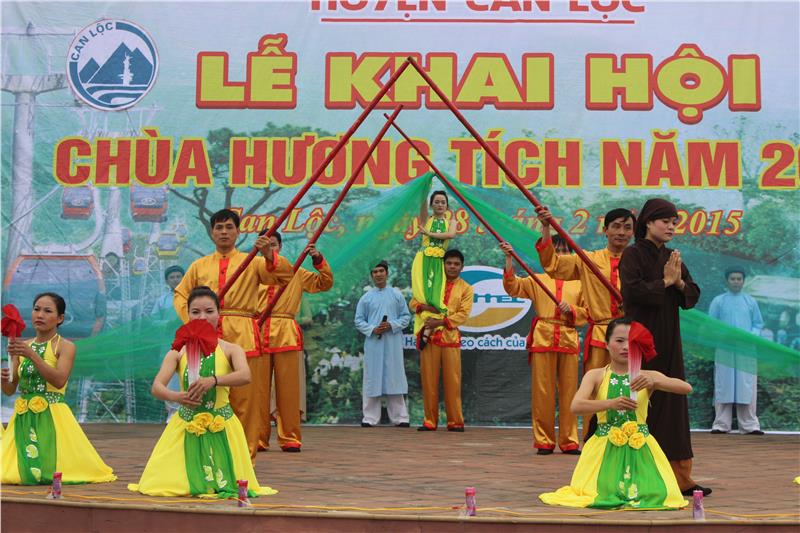
Ha Tinh has 89 folk festivals including temple festivals, pagoda festivals and cultural festivals. Festivals in Ha Tinh hold year round but focus on January and June in the lunar calendar. Festivals are usually associated with religious activities in temples, pagodas that worship gods, Buddha, national heroes and tutelary god. There are only festivals held in the spring or in the 3 first days of the New Year, such as Gheo singing festival in My Xuyen (Duc Tho) and annual fairy in Thinh Xa (Huong Son), and Spring Festival in Phu Phong (Huong Khe). There are festivals lasting throughout spring. Typically, Huong Tich Pagoda festival in Can Loc holds from the January 6th to March 15th of lunar calendar. The rugged path may be both precarious and challenging for pilgrims, but they brave it out to come here from every corner of the country. Everything happening here is imbued with the spiritual color. It reflects the culture of the region and shows people’s gratitude to the Goddess of Mercy. Legendary and historical, real and unreal, amid traces of the old days is a scared pagoda in the people’s heart.
Some festivals hold in the 1st lunar month as Thien Tuong temple festival (Hong Linh town), Thai Yen Temple festival (Duc Tho), Fishing festival in Dong Gian (Cuong Gian, Nghi Xuan), Truong Ninh Temple festival, and so on. The life is more modern, the traditional culture, especially spiritual culture is increasingly valued. One of the most outstanding values of the folk festival in Ha Tinh is directed to the source; to commemorate the heroes in the resistance against the invaders, reclamation, father of craft villages, celebrities; to create valuable literatures; to create beautiful customs and habits.
